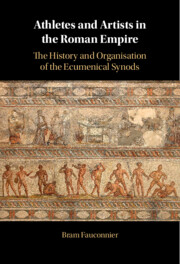Introduction
Published online by Cambridge University Press: 02 February 2023
Summary
This book opens with some introductory notes on the two ecumenical synods, marking the discrepancy between their importance in the festival world of the Principate and the obscurity they have fallen into in present-day scholarship. This is mainly due to the extremely fragmentary source material on their history and organisation. The ecumenical synods are mainly known from inscriptions, often heavily damaged, and papyri from Egypt. These diverse sources present us with a complex and often contradictory view. The most important documents for this study are decrees drawn up by the synods, their correspondence with emperors and membership certificates. A great variety in names and titles further complicates our understanding of the synods. Nevertheless, there are a number of basic elements that recur in the documents promulgated by the synods themselves, which are discussed briefly. The final part of the introduction sets out the structure of the book as well as the basic principles that form the core of the argumentation.
- Type
- Chapter
- Information
- Athletes and Artists in the Roman EmpireThe History and Organisation of the Ecumenical Synods, pp. 1 - 16Publisher: Cambridge University PressPrint publication year: 2023

